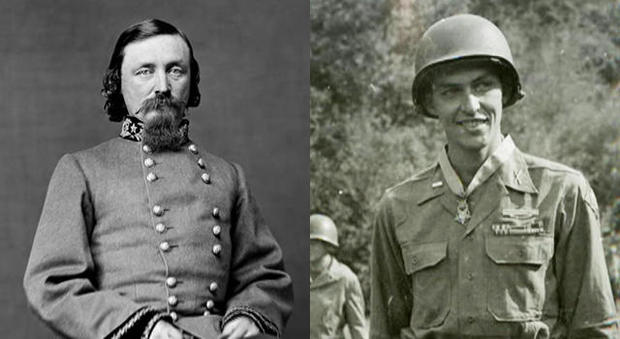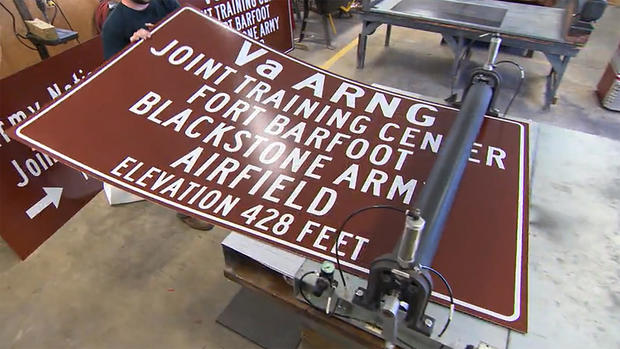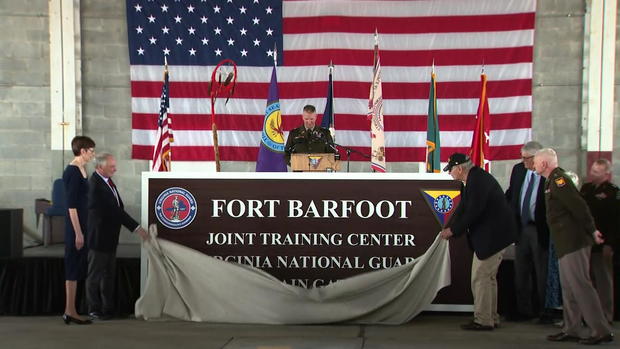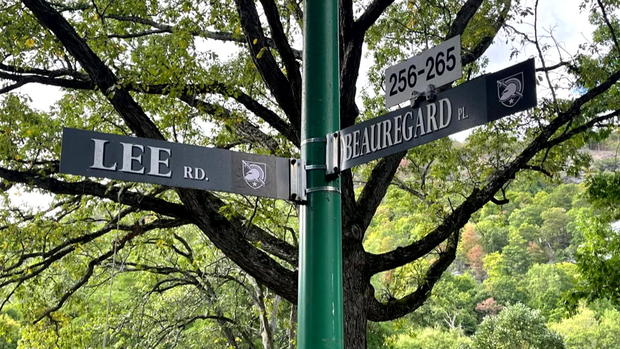▶ Watch Video: Military bases removing names of Confederates
“I wonder myself what took so long,” said retired Lt. Gen. Tom Bostick, a member of The Naming Commission, charged with renaming Army bases named in honor of Confederate generals. “What was galling is that we would still in this day and age have names of bases that represented traitors, who fought against their country and for the purpose of slavery.”
Bases such as Fort Pickett, named after Gen. George Pickett, who led the famous last charge of the Confederates at the Battle of Gettysburg.
Billie Coleburn, the former mayor of Blackstone, Virginia (the town nearest Fort Pickett) and editor of the local paper, said, “Here in rural southern Virginia, change comes very slowly, and we don’t always embrace change. There are many people I talk to – many, many of them are dear friends of mine – that are strongly opposed to it being renamed.”
“I’d say the majority of folks around here would tell you in a heartbeat, keep it Pickett,” Coleburn said.
Martin asked, “Is that because they think the name of Pickett should be honored?”
“Are there people here that still believe that the South had a right to secede?” Coleburn replied. “I mean, I don’t know anyone that say slavery was okay; there’s none of that still around.”

Fort Pickett was dedicated on July 3, 1942, on the anniversary of Pickett’s charge. It was dedicated at 3:15 in the afternoon – the exact time of Pickett’s charge. At the dedication, the governor of Virginia said Pickett “stands with (Robert E.) Lee and (Stonewall) Jackson among the immortals …”
History tells a different story. Retired Brig. Gen. Ty Seidule taught history at West Point, and would take his students on walks over the battlefield. At Gettysburg he related what happened during Pickett’s charge: “Twelve thousand, five hundred Confederate soldiers from three divisions attack to this position … and it is an absolute and utter catastrophe. They came into this kill zone, and just were slaughtered.”
Pickett survived, and in 1864, he summarily executed 23 U.S. Army soldiers. “After the war he skedaddles to Canada because he thinks he’s going to be hanged as a war criminal,” said Seidule.
The man who ordered Pickett to charge was Robert E. Lee, who quit the U.S. Army to command the Confederate forces. He is remembered at Gettysburg by a giant statue. Seidule said, “The idea was that Lee was a hero. How ironic that a person trying to destroy the United States of America becomes the great American.”
“Makes you wonder who won the battle?” asked Martin.
“Yes. The United States Army won the battle, no doubt about it, but who won the memory of that battle?”

Danny Clary is chief at the fort’s fire station, where you couldn’t turn around without seeing the name “Pickett.” When asked how he feels about the name coming down, he replied, “Sad. I understand why they’re doing it, but it’s been here a long time, and it’s going to take a lot of people a while to adjust.”
But it is now Fort Barfoot, after Col. Van Barfoot, who received the Medal of Honor for his bravery in World War II. It’s the first Army base in the United States to be named after a Native American.
Kyle Gee runs the sheet metal shop, which has been turning out signs for Fort Barfoot. You never realize how many there are until you start changing them.

Fort Barfoot is one of nine Army bases which will no longer be named in honor of Confederates.
Seidule said, “Commemoration is about our values. It’s how you inspire people.”

Case in point: Fort Bragg in North Carolina. Bostick said, “Who would stand up at in-processing a lot of new soldiers coming to Fort Bragg and say, “Let me tell you about the history of this name: Braxton Bragg was one of the worst generals in the Confederate army’?”
This week Fort Bragg will become Fort Liberty. Fort Polk in Louisiana (named for Lt. Gen. Leonidas Polk) is also due for a name change. “Polk was the most incompetent general of the war,” said Seidule.
Fort Benning (named after Brig. Gen. Henry Benning, a charter member of the Ku Klux Klan) has already changed to Fort Moore, after Hal and Julia Moore. He was the commander of American troops in the first head-to-head battle against the North Vietnamese; she forever changed the impersonal system which sent “regret to inform you” telegrams to families of the fallen.
Bostick said, “Julia Moore saw this happening and she said, ‘Not on my watch. I will personally deliver that telegram and I will put my arms around that family member.'”
It’s not just base names. It’s all the Confederate memorials and artifacts strewn across U.S. military installations. Bostick said he was surprised at the degree to which Confederate memorabilia was embedded in the Army culture: “There were hundreds of things that needed to change. There’s a Lee Gate and Lee Housing Area and Lee Barracks at West Point.”

Martin asked, “With all these names about to disappear, some people are going to say you are erasing history.”
“The battles that Lee fought in will still be studied, so we’re not erasing history,” Bostick replied. “What we are doing is commemorating the right leaders.”
Seidule said, “We’re not going to end racism in one fell swoop, but this isn’t a bad place to start.”
For more info:
Story produced by Mary Walsh. Editor: Joseph Frandino.
See also:
- Rooted in history: Gettysburg’s “Witness Trees” (“Sunday Morning”)
- Gallery: The Battle of Gettysburg






